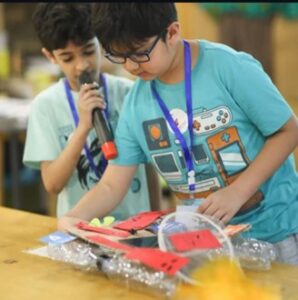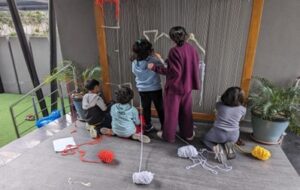How a Micro-school in Pakistan Empowers Students with Life-long Learning Skills
By, Maria I. Khan and Sumaiya Zohaib
We are delighted to share this guest blog from NYKids Research Collaborator (and former post-doctoral scholar) Maria Khan and colleagues highlighting the journey from student agency to student empowerment undertaken by a micro-school in Lahore, Pakistan.
About Leo’s Workshop
Leo’s Workshop, created by the Beaconhouse School System, is a micro-school nestled in the heart of Lahore, Pakistan. Leo’s Workshop believes in child-led, project-based learning where a teacher’s role is that of a facilitator who nurtures the curiosity and imagination of each child in an experiential and collaborative environment to create a love for lifelong learning. Leo’s Workshop emphasizes sustainability, digital literacy, and social entrepreneurship to ensure students are equipped with the skills necessary to thrive in an ever-evolving world.
With under 100 elementary-aged students, the small, but cozy, school building has dedicated spaces for the “inquirers” (ages 3-5 years), “builders” (ages 6-7 years; grades 1 and 2) and “thinkers” (ages 7-9; grades 3-5). The dynamic interaction between different age groups fosters a supportive community where children learn from each other thereby building confidence and leadership skills. In addition to these multi-grade classrooms, Leo’s Workshop has a Makers Studio, an Art Studio, and a Music Studio.
What is Student Agency and Why is it Important?
Simply put, student agency is “giving children the power to act in their own learning.” As NYKids research has shown, student agency is supported by giving students a choice and a voice so they can make purposeful decisions and also have the ability to make their ideas heard and needs expressed.

Student agency shapes critical thinking and problem solving skills among students. This approach also appreciates that students come with a variety of skills, aptitudes and with different backgrounds, which together affect their attitude towards learning. Within a classroom, student agency can be supported by encouraging student belongingness and building student self-esteem and confidence.
Fostering Student Agency at Leo’s Workshop
Leo’s Workshop builds students’ lifelong learning skills by empowering children to take ownership of their learning processes. While recognizing that each student is unique, classroom teachers (called “facilitators”) focus on skills such as self-advocacy, perseverance, risk-taking, creativity, innovation, problem-solving, and curiosity. Their goal is to create a classroom environment that helps students understand their social-emotional and academic needs.

Students actively shape their learning experiences at Leo’s Workshop by making decisions and using their voices. Teachers keenly observe students’ interests and facilitate the design of projects that align with both educational standards and students’ interests. For example, Builders (grades 1 and 2) who are extremely passionate about animals undertook the “Puptastic Animals” project. They chose the title, defined student roles, selected the animals they wanted to research, and formulated the problem statement: “How can we, as animal rescuers, help animals in need by creating a pet care guide?” This approach enabled them to create a comprehensive pet care guide while fully engaging with their interests.
When students are given the opportunity to provide meaningful input, they learn leadership skills like active listening, the ability to give and receive feedback, and how to pose creative solutions to complex challenges. An example of this is when the Thinkers (grades 3, 4 and 5) participated in the global challenge at “Designathon Works” which focused on a circular economy. They were tasked with designing zero-waste solutions for a cleaner environment. Guided through the design thinking process by the Maker Studio Facilitator, the students developed and refined their prototypes, eventually pitching them to a panel of judges. One notable prototype was “OClean,” a solar-powered boat aiming to clean oceanic trash.
Social-Emotional Learning at Leo’s Workshop
Social-emotional well-being is of utmost importance at Leo’s Workshop. The school community has a “Weave Your Emotions” project wall, an idea conceived by two 4th graders, that provides students with a creative outlet for emotional expression. It has colored blocks showing different emotions people feel throughout their day in school.

Each nook and corner of the school building displays students’ work. Classroom walls are papered with student ideas, from a set of norms and expectations to project outcomes, which provides a snapshot of their learning journey. The visible thinking methodology helps students externalize their thought processes making abstract ideas concrete and actionable. By regularly reflecting on their work and seeing their ideas evolve, students develop critical thinking, problem-solving, and metacognitive skills.
At Leo’s Workshop, the promise, power, and practice of student agency is apparent through the creation of spaces for students to build and develop agentive skills such as advocating for their educational needs, be active learners inside and outside classrooms while elevating their individual identities, and determining how to use their voices and exercise choice. As described above, students’ social-emotional well-being is also prioritized through a range of practices.
Tips for Nurturing Student Agency to unlock learning potential in young learners:
Student agency building is a process that has to begin with adults. Here are some tips to cultivate student agency in your school settings:
- Co-establish classroom norms and expectations.
- Involve students in decision-making processes related to classroom activities and project outcomes.
- See yourself as a co-learner in the classroom.
- Foster a classroom culture where the student voice is respected and encouraged.
- Engage with students through effective two-way communication.
- Integrate breaks for students to reflect on their learning progress and set goals for improvement.
- Provide students with choices to exhibit their understanding of concepts or completing tasks through flexible educational pathways.
- Build community through culturally responsive practices.
- Collaborate and communicate with your colleagues so you know what works for whom, and under what circumstances.
Thank you for your continued interest in NYKids! Please keep up with our latest news by following us on Twitter, Instagram, or Facebook. You can also read our latest research on our website or contact us with feedback at nykids@albany.edu.
Maria I. Khan, PhD is a NYKids Research Collaborator and a parent of a child at Leo’s Workshop. Sumaiya Zohaib, M.Phil is the Head Facilitator at Leo’s Workshop. You can learn more about Leo’s Workshop on their website or on their Facebook and Instagram pages.
